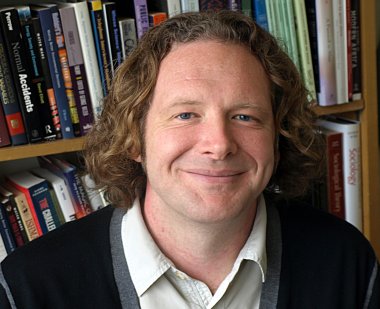EUGENE, Ore. — (March 18, 2012) — Technology alone won't help the world turn away from fossil fuel-based energy sources, says University of Oregon sociologist Richard York. In a newly published paper, York argues for a shift in political and economic policies to embrace the concept that continued growth in energy consumption is not sustainable.
 Many nations, including the United States, are actively pursuing technological advances to reduce the use of fossil fuels to potentially mitigate human contributions to climate-change. The approach of the International Panel on Climate Change assumes alternative energy sources — nuclear, wind and hydro — will equally displace fossil fuel consumption. This approach, York argues, ignores "the complexity of human behavior."
Many nations, including the United States, are actively pursuing technological advances to reduce the use of fossil fuels to potentially mitigate human contributions to climate-change. The approach of the International Panel on Climate Change assumes alternative energy sources — nuclear, wind and hydro — will equally displace fossil fuel consumption. This approach, York argues, ignores "the complexity of human behavior."
Based on a four-model study of electricity used in some 130 countries in the past 50 years, York found that it took more than 10 units of electricity produced from non-fossil sources — nuclear, hydropower, geothermal, wind, biomass and solar — to displace a single unit of fossil fuel-generated electricity.
"When you see growth in nuclear power, for example, it doesn't seem to affect the rate of growth of fossil fuel-generated power very much," said York, a professor in the sociology department and environmental studies program. He also presented two models on total energy use. "When we looked at total energy consumption, we found a little more displacement, but still, at best, it took four to five units of non-fossil fuel energy to displace one unit produced with fossil fuel."
► Audio: Richard York on his study's message
For the paper — published online March 18 by the journal Nature Climate Change — York analyzed data from the World Bank's world development indicators gathered from around the world. To control for a variety of variables of economics, demographics and energy sources, data were sorted and fed into the six statistical models.
Admittedly, York said, energy-producing technologies based on solar, wind and waves are relatively new and may yet provide viable alternative sources as they are developed.
"I'm not saying that, in principle, we can't have displacement with these new technologies, but it is interesting that so far it has not happened," York said. "One reason the results seem surprising is that we, as societies, tend to see demand as an exogenous thing that generates supply, but supply also generates demand. Generating electricity creates the potential to use that energy, so creating new energy technologies often leads to yet more energy consumption."
Related to this issue, he said, was the development of high-efficiency automobile engines and energy-efficient homes. These improvements reduced energy consumption in some respects but also allowed for the production of larger vehicles and bigger homes. The net result was that total energy consumption often did not decrease dramatically with the rising efficiency of technologies.
"In terms of governmental policies, we need to be thinking about social context, not just the technology," York said. "We need to be asking what political and economic factors are conducive to seeing real displacement. Just developing non-fossil fuel sources doesn't in itself tend to reduce fossil fuel use a lot — not enough. We need to be thinking about suppressing fossil fuel use rather than just coming up with alternatives alone."
The findings need to become part of the national discussion, says Kimberly Andrews Espy, vice president for research and innovation at the UO. "Research from the social sciences is often lost in the big picture of federal and state policymaking," she said. "If we are to truly solve the challenges our environment is facing in the future, we need to consider our own behaviors and attitudes."
About the University of Oregon
The University of Oregon is among 108 institutions chosen from 4,633 U.S. universities for top-tier designation of "Very High Research Activity" in the 2010 Carnegie Classification of Institutions of Higher Education. The UO also is one of two Pacific Northwest members of the Association of American Universities.
Media Contact: Jim Barlow, director of science and research communications, 541-346-3481, jebarlow@uoregon.edu
Source: Richard York, associate professor of sociology and environmental studies, 541-346-5064, rfyork@uoregon.edu
Note: The University of Oregon is equipped with an on-campus television studio with satellite uplink capacity, and a radio studio with an ISDN phone line for broadcast-quality radio interviews. Call the Media Contact above to begin the process.